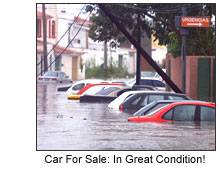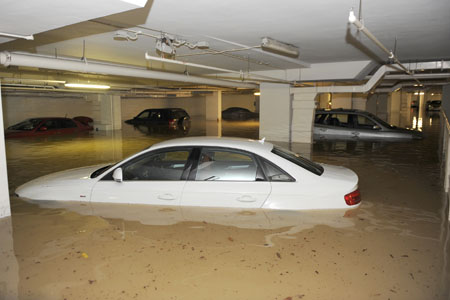Fraud Tip of the Day - June 10
How to Spot a Flood-Damaged Car
 After a flood, it's not long before flood-damaged cars appear on the market. These flood car detection tips can help you spot a water-damaged car.
After a flood, it's not long before flood-damaged cars appear on the market. These flood car detection tips can help you spot a water-damaged car.
Any time there's a hurricane or storm that results in flooding, cars damaged by water make their way into the auto market. Many private parties, auto auctions and some car dealerships allow the vehicles to dry, clean them up and then try to sell them.
In many states, individuals legally obligated to disclose that the car they're selling has spent some quality time underwater.
Without close examination by an experienced eye, consumers may not notice the telltale signs that a car's been submerged in floodwaters. The car may run great now but exposure to water can wreak havoc on modern vehicles.
The dangers of buying a flooded car include rust and damage to major mechanical parts such as the engine or transmission. The water can also damage sensitive electrical systems including important onboard computers often located on a car's low points, like under the seats or in the trunk. Do I even have to talk about mildew and mold? It's easy to see why people want to unload these cars as fast as they can. Fortunately, there are signs you can look for that indicate a car's been underwater.
When you're shopping for a car, look for rust and sand under trunk mats or in fender wells. Someone selling a flood car is bound to miss something while they prepare it for sale. If you see clear signs of water damage, walk away from the deal. There are plenty of other cars for you to purchase. To help you further, we have compiled several tips to help consumers spot vehicles flood-damaged vehicles.
Flood Car Detection Tips:
How to Spot a Flood-Damaged Car

Any time there's a hurricane or storm that results in flooding, cars damaged by water make their way into the auto market. Many private parties, auto auctions and some car dealerships allow the vehicles to dry, clean them up and then try to sell them.
In many states, individuals legally obligated to disclose that the car they're selling has spent some quality time underwater.
Without close examination by an experienced eye, consumers may not notice the telltale signs that a car's been submerged in floodwaters. The car may run great now but exposure to water can wreak havoc on modern vehicles.
The dangers of buying a flooded car include rust and damage to major mechanical parts such as the engine or transmission. The water can also damage sensitive electrical systems including important onboard computers often located on a car's low points, like under the seats or in the trunk. Do I even have to talk about mildew and mold? It's easy to see why people want to unload these cars as fast as they can. Fortunately, there are signs you can look for that indicate a car's been underwater.
When you're shopping for a car, look for rust and sand under trunk mats or in fender wells. Someone selling a flood car is bound to miss something while they prepare it for sale. If you see clear signs of water damage, walk away from the deal. There are plenty of other cars for you to purchase. To help you further, we have compiled several tips to help consumers spot vehicles flood-damaged vehicles.
Flood Car Detection Tips:
- If you're buying a used car, always have it inspected by a trusted mechanic.
- Ask to see the title of any used car you're thinking about buying. Check the date and place of transfer. Did the car come from a state ravaged by floods? Is "salvage" stamped on the title?
- Order a vehicle history report from an online service such as CarFax or Autocheck. These are a great way to find out where a vehicle's been and what's happened, or not happened, to it
- Examine the gauges on the dashboard to see if they're accurate. Check for signs of water, too.
- Test everything related to the car's electrical system. Test the lights, windshield wipers, turn signals, heater, air conditioner, and cigarette lighter several times to make sure they all work.
- Examine the wiring under the dash to see if they bend or crack. Once they've been wet, wires become brittle and can crack or fail.
- Look in the trunk, glove compartment, under the seats, and dash for signs of m&d, rust or water damage
Last edited:



